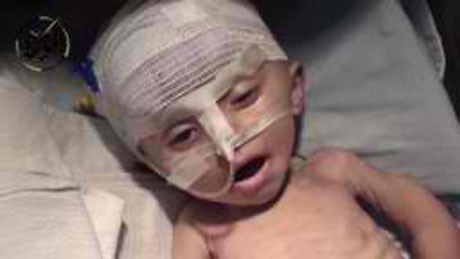Starvation in Syria: A War Crime
Famine is the latest and most brutal weapon the Syrian government is using to punish civilians in opposition-held areas. Children with bloated heads, mothers with no milk and walking skeletons are what doctors and aid workers are seeing on the outskirts of Damascus.
(Baonghean) -Famine is the latest and most brutal weapon the Syrian government is using to punish civilians in opposition-held areas. Children with bloated heads, mothers with no milk and walking skeletons are what doctors and aid workers are seeing on the outskirts of Damascus.
One of the first famine victims was one-year-old Farah Atout, who arrived at the Maliha Medical Center in a severely weakened state, moaning as doctors struggled to find a vein to feed her intravenously. “I remember the child very clearly, about a year old and weighing only 4kg,” said Mazin Ramadan, the doctor who treated Atout last November. Her family had fled their village, fleeing with little more than the clothes on their backs and little food. “They came and put the child in our arms, hoping that with a few doses of medicine she would get better.” Within 48 hours, the girl was a skeleton, bandaged and covered with a frame, revealing only her pale, trembling face. But the scene, once gruesome and dramatic, is now all too familiar, playing out over and over again in the suburbs of Damascus.
 |
| A malnourished child in Yarmouk refugee camp. |
A nurse at the Yarmouk Palestinian refugee camp, who spoke on condition of anonymity for fear of reprisals, said about four adults were injured every day. These civilians, simply trying to find food in the fields near Damascus, were targeted by snipers and even killed. The Yarmouk refugee camp, established in 1957, has been an unofficial refuge for thousands of Palestinians for decades, victims of Israel’s war on Islam.
At the National Hospital of South Damascus, near Yarmouk, 43 people die of hunger every day, 22 of them children. The youngest is only 23 days old. Most have died in the past month and the number is rising rapidly, said a medical worker. "Sometimes it's just a case of malnutrition or lack of medicine, but we are completely hopeless because there is nothing we can do for the children. We have reached a point where it is normal for a child to die every two or three days," said a doctor who declined to be named for fear of reprisals from the government. Parents are also devastated by the plight of their children. "A few days ago I had a two-year-old patient in critical condition. When I was told, the father just calmly said without hesitation, 'Okay, I will take him home, what else can I do, no food and no medicine.'"
"The first 1,000 days of life are incredibly important in a person's development. When a baby is in the womb and the mother doesn't get enough nutrition, the baby will not grow and develop, and that loss cannot be compensated," said Greg Barrow, a spokesman for the United Nations World Food Program.
In a widely circulated video on YouTube, a 10-year-old boy with a skeletal body named Bashar Kaboush in the eastern town of Ghouta is shown. A man claiming to be a relative of the boy can be heard shouting in the video, "Does God accept this? Look at this child. Does the world accept this? Is this a human body? Is this a human arm? He is only 10 years old."
The cause of the famine is the blockade of the food supply line to the opposition-held areas by the government. In the rebel areas, there are now only war-torn fields and very few food stocks, not enough to feed the thousands of people blocked by government tanks. Many believe this is a punishment by the government for the opposition areas.
The tense fighting makes it difficult to estimate the current situation, but the current figure is 800,000 civilians under siege. Amnesty International said: "The Syrian government is brutally punishing civilians in rebel-held areas. This is a war crime, the blockade must be lifted immediately and humanitarian aid must not be used for political or military purposes."
The Geneva II peace talks are likely to produce some agreements on humanitarian aid, but will they be enough to improve the situation in Syria, where innocent people are dying, while humanitarian aid is available everywhere in the country? War is about bloodshed and shooting, but it is also a war that tramples on humanity and love for one another. This is the question confronting the Syrian authorities, especially when those who die are just victims of the war.
Ganoderma
